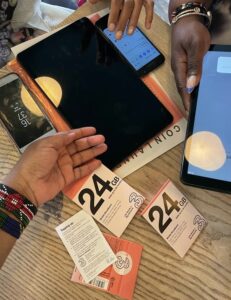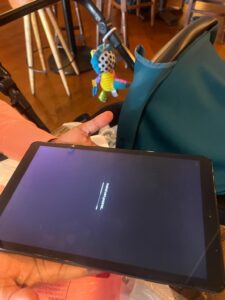How data and devices are breaking down barriers for marginalised women
As the National Databank and National Device Bank expand, the incredible social impact is clear to see. Stories from the National Digital Inclusion Network and organisations like 4Mnet highlight the power of data and devices to empower people, create independence, and strengthen communities.
The National Databank and the National Device Bank are now being rolled out nationally and the social impact we’re seeing is incredible. We hear wonderful stories from the National Digital Inclusion Network about how access to devices and connectivity transforms lives, helping people to become more independent, financially secure and more connected to friends and family.
We heard from Digital Inclusion Hub 4Mnet, a unique programme led by black migrant women. They train women living with HIV across the UK as Mentor Mothers to provide psycho-social support to peers in their pregnancy journey and beyond.
4MNet give data and devices to the women they work with, they say:
“The women we support face unique and complex gendered issues. This includes societal and self-stigma, mental health issues, intimate partner violence, immigration, and low incomes or poverty. The majority of these women are black migrant women who face marginalisation and more structural barriers throughout their life course.

“Digital and data poverty is a prominent issue for women, especially from minority communities. Some mothers live in shared homes and don’t have access to suitable devices or data bundles. It also causes further isolation from an inability to access virtual education, health and social services and support.
“Receiving this support [data and devices] has provided a highly needed resource to the women we support who often face intersectional barriers that make devices like these the lowest on their long list of important needs. It has enabled us as an organisation with no core funding, by enhancing our capacity to address digital access and improve quality of life for women and their families.
“25 women have received tablets and data. Most are young mothers with young children and migrants living in Temporary shared accommodation. Supporting them with data and devices has improved their quality of life, as they are now able to study and join our Zoom webinars, help their children with homework, undertake safeguarding training and ongoing online activities.
“4MNet, the women we support and their families really appreciate the support provided and would like to say a huge thank you to Good Things Foundation’s National Device Bank and National Data Bank for the vital support.”
4Mnet also provided some testimony from the women they have supported:

- “Thank you so much for the tablet . Now I will be able to have good zoom coverage and do my CV as I don’t have to use the local library.”
- “I Just wanted to say thank you so much for the tablet. My son is really happy now he can do his homework at home.”
- “The tablet is such a lifesaver. It keeps my son busy whenever I need me time.’’
If you’re a community organisation…
The National Databank is open to community organisations who are members the National Digital Inclusion Network. Joining the network is free and gives you access to support and resources. However you are welcome to join just to access the National Databank. Find out more and register here or join one of our monthly Q&A sessions here.
Already part of the network? The application form for the National Databank can be found here.
